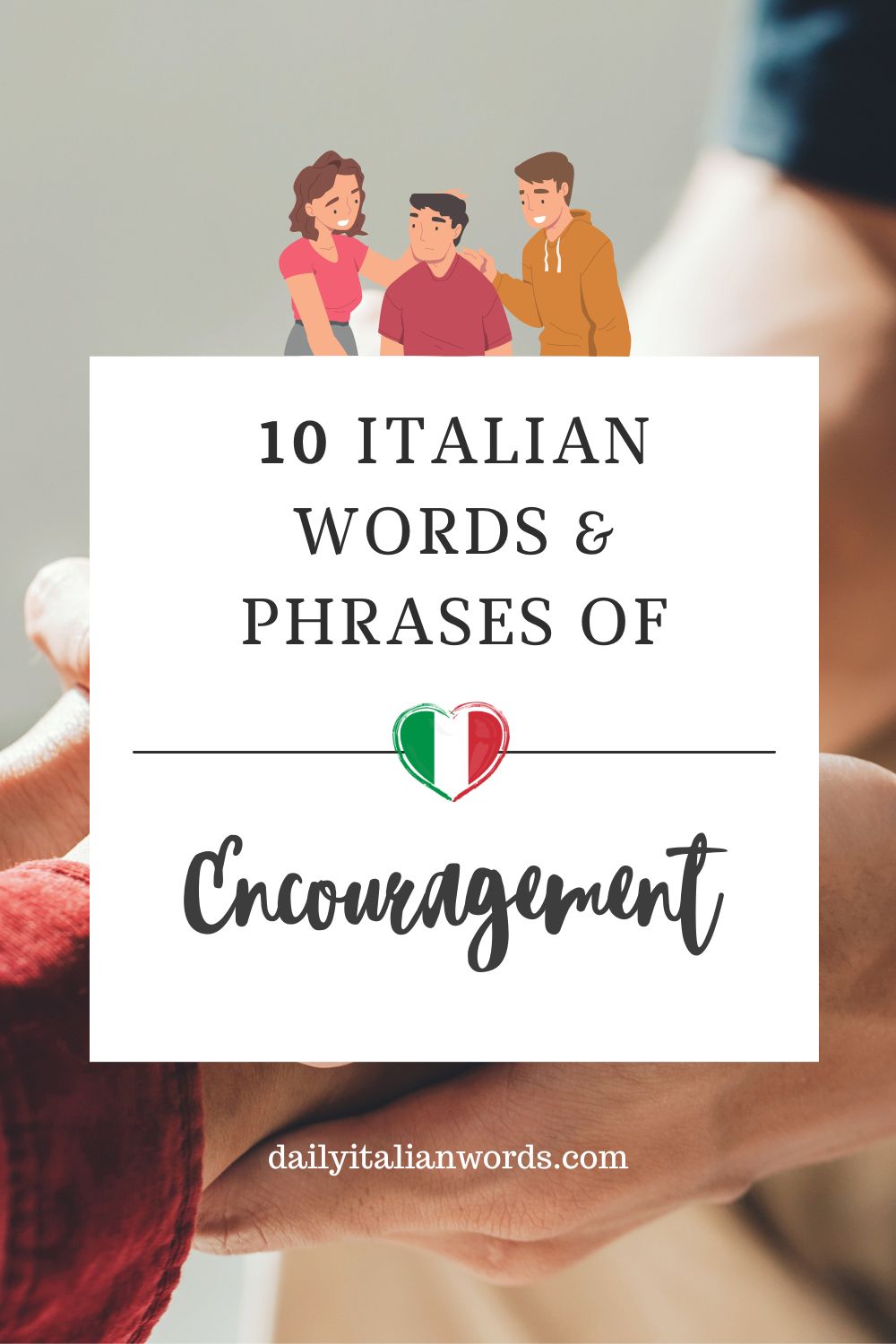Life can be a struggle at times but with the help of comforting words of encouragement from a friend or family member, and a little perseverance and patience, it is possible to overcome even the most daunting of challenges. The important thing is keep going, even when you feel that the easiest option would be to give up.
If one of your Italian friends is going through a difficult time or has experienced a setback in the pursuit of their dreams, here are some useful phrases of encouragement that will hopefully give them the confidence to keep moving forward!

1. Dai!
English meaning: Come on!
If someone yells out Dai! to you in Italian, they aren’t ordering you to “die” (which is what I used to think when I first arrived in Italy). Rather it is a very common exclamation that is close in meaning to Come on! in English. It is often used in conjunction with other words of encouragement, such as su, forza and coraggio.
Non ti fermare, il traguardo è vicino! Dai!
Don’t stop, the finish line is close! Come on!
2. Ce la fai!
English meaning: You can do it!
Ce la fai! – or the formal version Ce la fa! – is a very common phrase of encouragement used in various situations. For example, if your son or daughter is struggling with a homework assignment, you can say Ce la fai! to boost his or her morale. It is sometimes preceded by the interjection Dai! which we saw above.
Dai che ce la fai! Hai quasi risolto il problema.
Come on, you can do it! You’ve almost solved the problem.
A slight variation on this phrase is Ce la puoi fare! (formal: Ce la può fare!) It has exactly the same meaning.
3. Io credo in te.
English meaning: I believe in you.
Nothing raises the spirits like hearing someone say that they believe in you. However, keep in mind that, as in English, this expression is very sincere and shouldn’t be used flippantly.
Io credo in te. Sei la persona più in gamba che io conosca.
I believe in you. You’re the most capable person I know.
4. Credi in te stesso.
English meaning: Believe in yourself.
Instead of saying that you believe in the other person, you could encourage them to believe in themselves.
Se credi in te stesso, tutto è possibile.
If you believe in yourself, anything is possible.
Another close variation on this phrase is Abbi fede in te stesso which means Have faith in yourself.
5. Non mollare!
English meaning: Don’t give up!
The word mollare means to give up, back down or cave in. This expression works in exactly the same way as its English equivalent.
Non mollare proprio adesso! Ce l’hai quasi fatta!
Don’t give in now, you’ve nearly made it!
A synonym of mollare is arrendersi – meaning to give up or surrender – so you can also say Non ti arrendere!
6. Riprovaci!
English meaning: Try again!
If at first you don’t succeed, riprovaci! 😉
The verb riprovare is made up of two parts: ri- (again) and provare (to try). The ci you see on the end means it in this context.
Dai, riprovaci! Non scoraggiarti.
Come on, try again! Don’t be discouraged.
7. Coraggio!
English meaning: Come on! You can do it!
Coraggio literally translates as courage but when used as an exclamation, it is closer in meaning to expressions like Come on! or You can do it! In situations where you want to raise someone’s spirits, you also can use Coraggio! to mean Cheer up!
Coraggio, sei quasi arrivato!
Come on, you’re almost there!
Another variation on this is Fatti coraggio! which can translate as anything from Chin up! to Hang in there!
8. Forza!
English meaning: Come on! Go! You can do it!
Forza! as an exclamation is almost identical to Coraggio!, albeit a little more emphatic and highly charged. You will often hear sports fans yelling out Forza! from the stalls to cheer on their favourite team for example. Indeed, a classic phrase you’ll hear at soccer matches is Forza Azzurri, which best translates as Come on, Italy!
Su, forza, avete quasi vinto la partita!
Come on, you’ve almost won the game!
What’s interesting is that Italians often use both in the same sentence – Forza e coraggio! – to encourage someone to push forward. In fact, they even appear together in a well-known idiom:
Forza e coraggio che la vita è un passaggio!
Literally: Strength and courage because life is a ride!
Forza is often used with other encouraging words like su and dai as well. Sometimes all three can appear in one utterance!
Variations on Forza! include Sii forte! and Fatti forza! which can be translated as Hang in there! or Be strong!
9. Andrà tutto bene, vedrai!
English meaning: Everything will be fine, you’ll see!
If you are confident that everything will work out in the end – or would at least like to convince your friend to think as such – you may want to use the phrase Andrà tutto bene! (lit: everything will go well). To add extra emphasis, feel free to tack on the word Vedrai! (You’ll see!)
Non ti preoccupare! Andrà tutto bene, vedrai.
Don’t worry. Everything will be fine, you’ll see!
10. In bocca al lupo!
English meaning: Good luck! Break a leg!
In bocca al lupo! is an idiomatic way of saying Good luck! or Break a leg! in Italian. It literally translates as in the mouth of the wolf.
The customary response to this is Crepi (il lupo)! (Lit: Death to the wolf) rather than Grazie! (Thank you!)
Ho sentito che domani hai un esame. In bocca al lupo!
I heard that tomorrow you have an exam. Good luck!
5 Popular Quotes of Encouragement
There are numerous popular quotes related to the theme of encouragement but the five below are my favourites!
1. Ciò che non ci uccide ci rende più forti. – Friedrich Nietzsche
English translation: What doesn’t kill you makes you stronger.
2. Non dubitare mai di chi sei. – Stephanie Lahart
English translation: Never doubt who you are.
3. In mezzo a ogni difficoltà si trova un’opportunità. – Albert Einstein
English translation: In the middle of difficulty lies opportunity.
4. Non avrai mai fallito finché continuerai a provare.
English translation: You will never fail as long as you continue to try.
5. Non importa quante volte cadi. Ma quante volte cadi e ti rialzi. – Vince Lombardi
English translation: The greatest accomplishment is not in never falling, but in rising again after you fall.

Heather Broster is a graduate with honours in linguistics from the University of Western Ontario. She is an aspiring polyglot, proficient in English and Italian, as well as Japanese, Welsh, and French to varying degrees of fluency. Originally from Toronto, Heather has resided in various countries, notably Italy for a period of six years. Her primary focus lies in the fields of language acquisition, education, and bilingual instruction.


